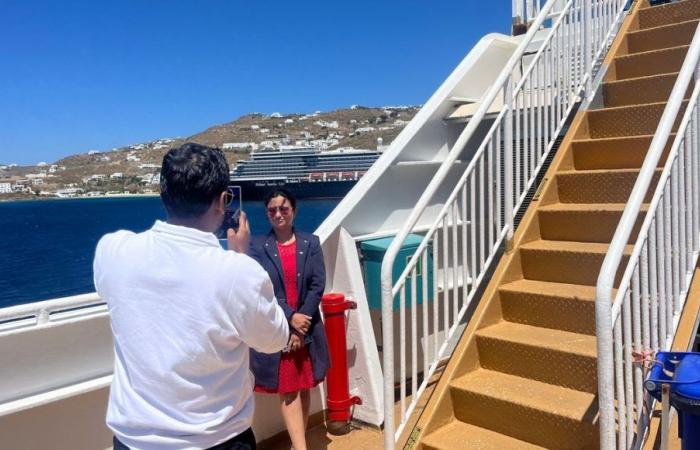First wave of severe heat in Greece. Yesterday, the thermometer climbed above 44 degrees in Athens, and tourists were banned from visiting the Parthenon from noon to 5 p.m. Very high temperatures also on the island of Crete and the Peloponnese peninsula. Here too, several archaeological sites had to be closed during the hottest hours.
Faced with this early heatwave, civil protection was put on alert. The Greeks still have in mind the devastating fires of last summer, which destroyed 175,000 hectares and led to the repatriation of tens of thousands of tourists. Climate change is disrupting the country’s biggest industry: tourism. But he is not the only one. Residents of tourist islands, exasperated by the appropriation of the seaside by deckchair rental companies, launched “the movement of the towels“, to demand free access to the beaches. Other voices are being raised to denounce overtourism accused of causing nuisance, rising prices and deterioration of the environment. It must be said that Greece broke a record last year last: it welcomed 33 million tourists on barely 10% of its territory Because this influx is mainly concentrated on the islands, so praised by tour operators.
There are the “must-sees”, the “unmissable”, the “must-visit” islands, celebrated for their “dazzlingly white” villages, and their coves “with clear waters”, for their landscapes described as “majestic” , “sumptuous”, “magical” or “enchanting”. All this is true, but for these islands, is this frenetic growth in tourism really a blessing?
Along with Crete, Euboea, Corfu, Rhodes, Thassos is one of the last green islands of Greece. Forests of pine and oak trees, fields of olive trees as far as the eye can see. Long sandy beaches and coves. It is compared to Corsica. Unfortunately, several of them have been severely damaged in recent years by gigantic fires. Last year, Prime Minister Kyriakos Mitsotakis came in person, during the legislative election campaign, to visit the island of Thassos to congratulate the inhabitants on the economic growth returned thanks in particular to tourism. He also promised new investments to deal with recurring water problems, fires and to welcome tourists even more dignifiedly in the future… New roads have since been built, new equipment, several fire trucks have been purchased as reinforcement to deal with any type of incident. But it is enough to go up the 30 km of coastline which leads to Limenaria, from Limenas, the capital of the island, to perhaps understand what has happened over the last five years. Bungalows or resort hotels were hastily erected, most of the time on old olive fields, to accommodate more and more visitors each year, with new embankments. New places were born, a little artificial, with nightclubs, bars, pizzerias.
In Limenaria, sitting at a café table in front of the sea, the wise Spyros Marchetos, historian, writer, translator of a biography on Georges Sand, deplores the concreteization of the coast in Greece. “I remember a small village very pretty fisherman when I came here as a child, with its little white houses. Now they are illegally building two- and three-story houses with ancient Greek decorative elements, in all colors. Kitsch. For what ? Beauty is a human need, but this does not seem compatible with today’s economic model, because it is necessary to attract ever more tourists. It is a big mistake in Greece to create this tourist monoculture. This frenzy is not good. George Sand in his time, who often stayed on the island of Majorca in Spain, already promoted sobriety. Greece has chosen another path, it is in the process of Disneyfication“.
A “disneyfication” which has a price. The excessive consumption of drinking water, by these new hyper-air-conditioned hotels with large swimming pools and jacuzzis, is drying up the sources of the mountain villages just above. Cut-offs are frequent, and very embarrassing when it’s about putting out a fire… On the island of Thassos, in 2016, a gigantic fire ravaged 14,000 hectares of forests between the beaches of Aliki and the village of Theologos At the foot of a bare valley. still charred in certain places, not very far from Skala Potamia, the large seaside resort of the island built in a few years, with multicolored motels and bungalows on the sea, Barbara, local resident, in rage She points to a whole part of. the forest this time went up in smoke in August 2022, almost 277 hectares in total.It’s not just bad management, it’s also interests, because anything that costs a lot of money, like the maintenance of forests, brings no profit, as a result no one is interested. We could do a lot of things to avoid major fires, but in reality, if the woods are destroyed, it is also because there are vast investment plans for tourism. Sometimes these fires pave the way for the construction of large hotels. The problem is that it only benefits major tourism projects. But in reality, small farmers are being murdered.”. A priori, it is a banal quarrel between shepherds which would have ended in a settling of scores and caused the fire of Potamia. But many residents are surprised to see that fields of olive trees, once the country’s main source of wealth for oil production, often and above all disappear during these gigantic fires.
Towards sustainable tourism
In her office in Athens, facing the magnificent national garden, the largest forest park in the Greek capital, Tourism Minister Olga Kefaloyanni procrastinates a little on this “mass tourism” which would eat into green spaces every year. “There is an element of truth, and at the same time, it is completely exaggerated,” she explains, rolling her eyes. Things are more complex. We now have a ministry dedicated to civil protection and we We are prepared to face temperatures that exceed 40 degrees. Fires are generally caused by accident or lightning. Of course, there are people who do it on purpose, and we are now more vigilant. Above all, we are stricter with the criminals who cause the fires.”.
While all of Greece is preparing for its new summer season, temperatures are already scorching at the beginning of June, particularly in the Attica region around Athens, and are raising fears of new fires. The lights are red while the authorities expect new attendance records. But Minister Olga Kefaloyanni assures her, Greece has learned lessons from the past, and says it is ready to manage new crisis situations.
“All countries in the world must prepare to react to the consequences of global warming. Last summer we handled the situation in Rhodes very well. More than 2,0000 visitors were repatriated in the largest operation of its kind ever carried out in Greece without major incident. But Rhodes remains an extremely visited place and that is why the Greek Prime Minister, Kyriakos Mitsotakis, went in person to Rhodes last April, to meet representatives of the hoteliers there and those of European tourism. All these actors signed the Rhodes Convention to work hand in hand to ensure the transition towards greener, more environmentally friendly and sustainable tourism..
Aware of the bad image given by its gigantic fires which ravaged more than 60,000 hectares on the island of Rhodes alone last year, the authorities decided to compensate with vouchers the holidaymakers who in July 2023, had to evacuate rentals and hotels in Rhodes, because of the fires. “At the same time, to avoid concentrations, we encourage tourists to visit Greece in the low season, which is cooler from September to April, and we want to encourage them to go to other areas of the country, such as the region of Epirus, Pelion or Chacildica.”, adds the Minister of Tourism. It’s not just the islands. Greece offers a multitude of landscapes to discover, to live different experiences linked to culture, sport, gastronomy, and fully enjoy the authenticity of our country, and our famous “Filoxenia “, or sense of welcome.
But in the collective imagination, Greece is first and foremost the islands, and in particular the magnificent Cyclades archipelago, also a victim of its success. Mykonos and Santorini are experiencing all kinds of difficulties; water shortage, waste recycling problem, pollution, facing over-tourism. But other experiences are offered not far off the beaten track. This is the case in Marilia and Nick’s Eco Lodge, on the island of Tinos, which welcome dozens of tourists each year for long stays, in small comfortable stone bungalows, in the middle of ‘a vast permaculture vegetable garden. For ten years, thanks to hard work and aid from the European Union, this couple has created an entire wastewater and rainwater treatment network, as well as autonomous energy based on photovoltaic sensors, to enable their visitors to live in total immersion in nature. But this model of green tourism comes at a price. It costs at least 200 euros per night in high season. This is obviously not within everyone’s reach. So, faced with soaring rental prices, camping is slowly coming back into fashion.
In summer, Greece, like its fires, is in “tourist overheating”. Yet, each year, tourists flock to barely 15 to 20% of its 131,000 km² surface area. So more and more hikers, straw hats on their heads, set off to attack Mount Olympus, others prefer to cycle up the picturesque paths of the Pelion or the Peloponnese, far from the beaten track, to rediscover the sensations of the journey, always accompanied by the legendary blue of the Greek sky.
Summer Debate Time Listen later
Reading listen 43 mins






